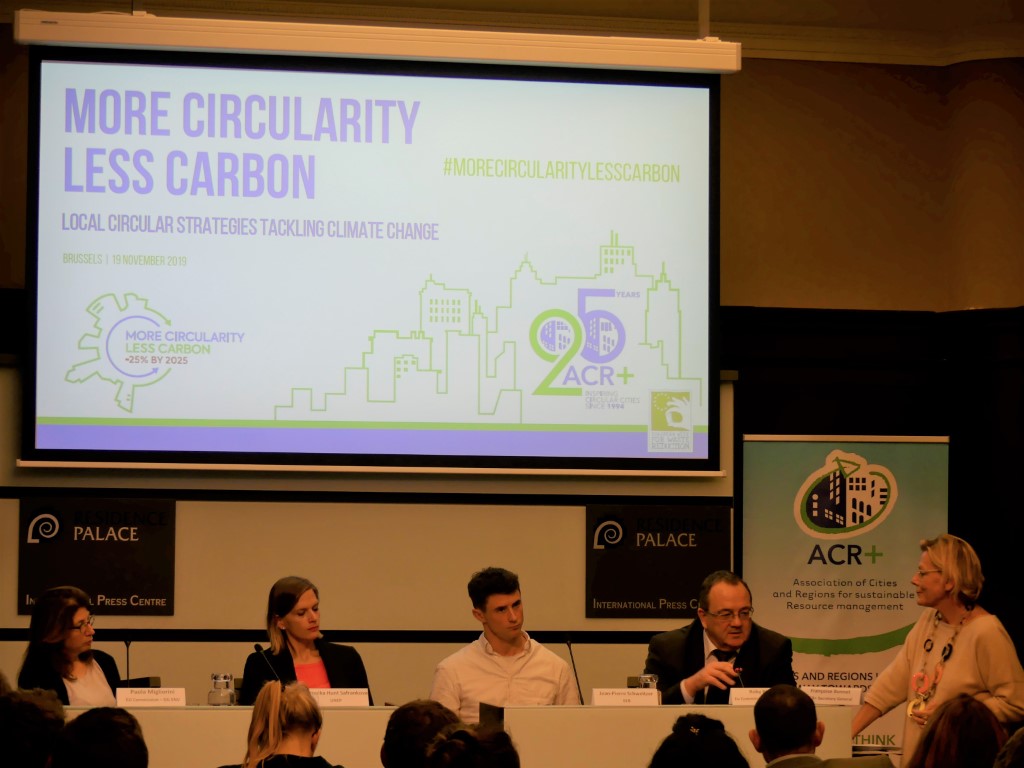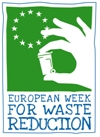With the launch of “More circularity, less carbon” ACR+ members are tackling an ambitious challenge: taking steps at their level to reduce the carbon emissions linked with local resource management by 25% by 2025. With this new campaign, unveiled today in Brussels, the network wants to encourage local public authorities to account for the carbon impact of their circular economy strategies.
Brussels, Belgium – How can cities and regions align their local circular economy policies with climate mitigation? Products account to up to 45% of the global carbon emissions, making circular economy an indispensable element to reach carbon neutrality by 2050. ACR+ is determined to show that cities and regions are crucial players to reduce the carbon footprint of several key sectors – namely food, construction, textiles, electronic and electrical equipment, and plastic – by implementing ambitious yet feasible actions to prevent losses and waste, extend the lifetime of products, and close the loops of materials.

Behind the ambitious goal of reducing by 25% the emissions linked with local resource management by 2025, the “More circularity, less carbon” campaign takes into account the diversity of contexts, scope of actions and policy instruments across participating authorities. ACR+ members will be invited to assess their carbon footprint, set their own action plans, monitor the results, and put in common their good practices and findings, under the coordination of ACR+ secretariat.
To enable the calculation of local carbon footprint, a specific tool will be developed: the Carbon Metric International. This will be adapted from the Scottish Carbon Metric, which has been used by Zero Waste Scotland since 2011 to measure the whole life carbon impacts of Scotland’s consumption of products. Based on local waste data, it assesses the emissions from resource extraction and manufacturing of the products that turned into waste. This type of carbon accounting gives a more complete picture of the impacts of products, allowing decision makers to prioritise their efforts for maximum carbon savings.
“As the circular economy moves mainstream it is even more important for us to recognise the importance it plays in addressing climate change. With increased pressure on the world’s resources and enhanced interest by the public on reducing their carbon footprint it is time re-focus our collective efforts to reduce and reuse more of our resources in a more circular system. This campaign will help our members make the clear link between their circular economy strategies on the ground and the global fight to save humanity through reducing carbon emissions,” declared Iain Gulland, ACR+ President and Chief Executive of Zero Waste Scotland.
For more details, read the manifesto of the “More circularity, less carbon campaign” online.
 The “More circularity, less carbon” campaign is launched during the European Week for Waste Reduction 2019. Running for already 10 years, this initiative promotes the implementation of awareness-raising actions about sustainable resource and waste management during a single week. To learn more and join the next edition, visit www.ewwr.eu
The “More circularity, less carbon” campaign is launched during the European Week for Waste Reduction 2019. Running for already 10 years, this initiative promotes the implementation of awareness-raising actions about sustainable resource and waste management during a single week. To learn more and join the next edition, visit www.ewwr.eu




